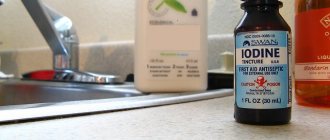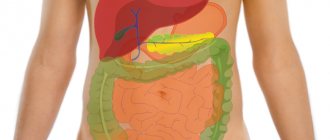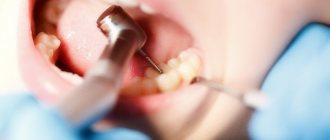1407
The unpleasant odor that appears during breathing is a phenomenon in itself that is somewhat alarming. However, if this smell resembles acetone, even more so.
It is practically impossible to get rid of it simply by brushing your teeth, even using toothpastes with bright aromatic ingredients. The reason for this is simple - the smell does not come from the mouth, but from the lungs.
That is why in many cases the problem of “acetone breath” is not dental. There is a list of conditions and diseases for which such breathing is a characteristic symptom.
Most of them require immediate contact with a clinician for the help of a specialist.
. And some are a consequence of completely safe physiological processes occurring in the body.
However, in any case, the acetone smell is an abnormal sign for a healthy person
, therefore requires taking certain measures depending on the reasons that caused it.
Formation of C3H6O in the body
The vital energy of the human body, at least most of it, comes from glucose. It is delivered to the cells through the blood circulation and enters each of them, saturating and nourishing.
However, there are times when the body lacks these substances. Or there is a problem of their delivery to the place of direct consumption.
This becomes a problem, since internal nutrition of the cells must still be carried out. The body solves this problem through replacement, that is, it begins to receive energy from other substances.
Typically, these substances - glucose substitutes for energy - are fats
, which have either already accumulated or enter the body in sufficient quantities.
To obtain energy, fats must be broken down. As a result, various “foreign” substances can enter the blood. These include acetone.
This substance from the blood begins to collect in the lungs and also in the kidneys. Accordingly, it is present in the air that is exhaled by a person and in the urine when a sample is taken.
Here are several characteristic conditions and diseases in which this characteristic odor is felt during exhalation.
- Starvation.
- Dehydration.
- Inappropriate diet.
- Various thyroid diseases.
- Kidney and liver problems.
- Diabetes.
The symptom of an acetone odor in itself does not imply the need for any treatment.
. However, it is worth taking a closer look at the problems that could cause it.
What are the causes of bad breath in a child? We will consider them in a separate publication.
This article explains why teeth hurt after filling.
Here: https://www.vash-dentist.ru/krasota-i-uxod/opolaskivateli/opisanie-dlya-polosti-rta-listerin.html - you will find reviews about Listerine mouth rinse.
A child’s breath smells like acetone – causes and treatment
The appearance of the smell of acetone from a child’s mouth is a good reason for an urgent examination by a specialist. Adults need to pay special attention and consult a doctor as soon as possible.
Acetone in the body
There is only one way for acetone to get into a child’s blood. It is considered an element of partial breakdown of fat and protein elements. For this reason, toxic substances called ketones accumulate in cells. Acetone refers specifically to their varieties.
First, ketones are oxidized almost to the point of harmless substances, after which they leave the body in urine and through the lungs. If, in comparison with the amount removed, the growth of toxic components is significantly higher, they do not have the best effect on the body’s systems, including the full functioning of the brain.
Reasons why your child’s breath smells like acetone
Halitosis is often accompanied by an increase in temperature.
Medicine considers this unpleasant phenomenon with the Latin word – halitosis. If a child’s (including infants and teenagers) breath smells like acetone, this is a characteristic signal of acetone syndrome.
Often the problem is accompanied by a similar aroma of urine, nausea and vomiting with an increase in body temperature.
The disease acetonemia is perceived by many doctors as a rather serious disease; the child’s appetite decreases as the work of metabolism increases.
This promotes an increase in the number of ketone cells, which is indicated by the following signals:
- the child’s breath smells like acetone and there is weakness and muscle weakness;
- pale coloration of the skin surface, and the appearance of bluish circles in the eye area;
- a sharp rise in body temperature, and it can rise above 38 degrees;
- paroxysmal pain in the intestinal tract;
- the occurrence of vomiting immediately after eating food;
- breath smelling of acetone.
Glucose is recognized as a key primary source of energy supply to body cells. Next, according to formation, adipose tissues are located. With a lack of glucose, cells switch to fats. For this reason, the body gradually accumulates not only acetone, but also other toxic substances. In more detail, the reasons why a child’s breath smells like acetone are indicated in the table below:
| Origin of the disease | Nature of the disease |
| Unbalanced diet | Violating the rules of eating places an excessive burden on the body. Taking a small amount of glucose causes protein and fat to break down, increasing the percentage of acetone. A child’s body needs an increased supply of glucose. |
| Diabetes | The disease is associated with impaired carbohydrate metabolism. A small percentage of insulin finds it difficult to cope with the required amount of glucose, which is why it gradually accumulates. The brain experiences a lack of glucose, so it switches the body to an enhanced operating mode, thereby forming a lot of ketone bodies. The child constantly experiences a feeling of thirst and frequent urination. Even when a patient has an excellent appetite, he still loses weight. |
| Acetonemia | When a strong acetone smell appears only once, we can talk about an acetone crisis. If the syndrome manifests itself systematically, this indicates acetonemic syndrome. |
| Infection | The child's body suffers from dehydration. The risk of developing the disease increases with long-term illnesses and poor food intake. Boys are predominantly affected. |
| Neuro-arthritic diathesis | Often the disease manifests itself in girls. Due to poor liver function, blood cells gradually accumulate ketone elements and uric acid. |
| Thyroid diseases | The gland is responsible for the volume of hormones. With any dysfunction, hormones are born in double numbers, which accelerates the breakdown of protein and fatty substances. |
| Liver and kidney problems | In the body, these two organs are necessary for filtration, ridding the body of everything that is not needed. If their functioning is not stable, substances begin to accumulate. |
| ENT diseases, etc. | The appearance of a characteristic odor during viral infections and ENT ailments appears due to an increase in metabolic rate and decreased appetite. As a result, accelerated processing of proteins and fats occurs, and an increase in the percentage of ketone bodies. |
Treatment of acetone odor and its causes
It’s good if parents contact a specialist as soon as their child’s breath starts to smell like acetone. In this case, the therapeutic course of treatment is aimed at two key areas:
- supplying blood cells with glucose;
- rate of ketone elimination.
If a child is vomiting, doctors recommend giving the child tea with the addition of a small amount of honey. This is necessary so that the amount of glucose has time to be replenished.
The liquid is given one teaspoon every 5 minutes to avoid the manifestation of a secondary gag reflex. The drink must be given at night. It is advisable to alternate tea with still mineral water or rice broth. In severe cases of the disease, glucose is injected into the blood intravenously through a dropper.
You cannot force a child to eat food against his wishes. If he himself asks for food, you can start with bread, cookies, baked apples, light soup or puree made from various vegetables. To avoid dehydration, adults must give the child the required amount of water.
If an increased percentage of acetone is detected, the following medications are used in therapy:
- “Atoxil” - absorb poisons and remove them from the blood;
- "Regidron" - restores the acid-base level;
- "Smecta" - like "Atoxil", makes it difficult to absorb toxic substances through the intestinal tissue.
Immediately after first aid is provided and the acute period of the illness ends, the baby is given the drug “Stimol”. It supplies the body with energy and improves overall condition. Betargin restores liver function quite well. For pancreatic dysfunction, doctors prescribe Creon. Its components improve digestion and give the child vigor.
Preventive measures
Be sure to regularly visit the dentist with your child as a preventative measure!
It is not advisable to drown out the smell of acetone with fresheners and toothpastes , otherwise in the future you will have to deal with serious diseases. It is good if the family visits the dentist once every six months, since this becomes a habit from an early age.
The first preventive measures start in early childhood in the form of high-quality teeth cleaning. Adults should teach the child to brush their teeth for a long time, and at least twice a day in the morning and evening, and after each meal, rinse their mouth well with plain water.
Habit formation should be carried out immediately after the appearance of the first teeth. Until the age of 7, the mother should be nearby and ensure that the child cleans the teeth and the space between them efficiently and for a long time.
Many fruits, berries and vegetables cope with mechanical cleansing of the oral cavity from various types of bacteria.
The thing about mints and sweets is that they dry out the inside of your mouth, which is an ideal environment for pathogens to grow.
To prevent dryness from appearing, during sports training and in stressful circumstances, the child should drink liquid.
If the child is still too small, teeth are cleaned using special brushes that adults put on their fingers and clean themselves.
Diet
Diet is an important component of treatment for elevated acetone in the body.
With an increased level of acetone in childhood, the child needs to follow a certain diet, as this helps to avoid relapses. First of all, doctors prohibit the consumption of canned food, and recommend completely eliminating the following products from the menu:
- legumes;
- sparkling water;
- fatty, fried, smoked and spicy foods;
- semi-finished meat products;
- sour cream, mustard and various sauces;
- chips;
- cauliflower.
Dietary nutrition must be followed for 2-3 weeks. It is advisable to feed your baby potato-based purees, vegetable-based first courses and rice porridges. After 7 days, crackers and lean meat are gradually introduced into the menu. Dishes are boiled or baked.
After about 14 days, raw vegetables, parsley, dill and other herbs are added to the diet. New food is introduced into the menu gradually to avoid overloading the body.
Popular questions
A pronounced smell of acetone from a child’s mouth indicates the presence of a disease. Usually the smell gives rise to feelings of apprehension and a lot of questions among parents.
Why might a baby's breath smell like acetone?
The occurrence of odor in an infant may indicate problems with the functioning of the pancreas, since this disease is closely related to the acetone crisis.
It is advisable to seek advice from a specialist as soon as possible. First you need to visit a pediatrician and an endocrinologist.
These specialists will definitely advise you on the percentage of blood sugar and the presence of other nuances.
The pediatrician will definitely send the baby to donate urine and blood for a thorough examination in the laboratory. If necessary, stool is collected and an ultrasound is performed.
Sometimes such troubles appear due to the presence of a parasitic infection, as well as kidney and liver disease.
What to do if you smell after vomiting?
The disease indicates an imbalance in metabolism and an acetonomic crisis. This condition manifests itself even before vomiting occurs. Initially, the child loses his appetite and experiences increased fatigue.
Afterwards, painful sensations appear in the navel area and other troubles. Adults need to call a doctor at home, and until the specialist arrives, gradually give the child a little liquid.
What does Komarovsky say about the smell of acetone from the mouth of children?
Dr. Komarovsky does not think that the smell of acetone is too dangerous for a child. He encourages parents to regard the syndrome as a characteristic feature of the child’s body. The main thing is that adults have a good understanding of what processes are moving in a child’s body at the time of exacerbation of the syndrome.
As for the reasons for its occurrence, the issue is quite controversial. Komarovsky identifies diabetes mellitus, problems with the kidneys, liver and pancreas, infectious processes and traumatic brain injuries as the main ones.
Source: https://dentoland.com/kids/u-rebenka-izo-rta-paxnet-acetonom.html
Starvation
Starvation simply due to lack of food is quite rare in our time, so we will not touch on this category of people. Let us pay attention only to that part of the well-to-do adult population who consciously torture their bodies by fasting
.
In this case, the refusal of a large number of products (sometimes a complete refusal of food) occurs solely for the sake of fashion and its trends. Or rather, with a great desire to quickly lose weight. This has nothing to do with medical indications and even contradicts them.
This section covers not only fasting, but also various diets.
Typically, the foods in the diet on such diets contain too few carbohydrates. The smell of acetone appears based on the way the body works to ensure its own vital functions.
Here are a few diets that may cause this symptom.
- Atkins diet
. Its peculiarity is the low consumption of carbohydrates for a kind of “switching” of body cells to replacing carbohydrates with fats as an energy component. - The Kremlin diet
is a less balanced domestic analogue of the Atkins nutrition system. - Diet of Kim Protasov
. - Protein diets
. - The “French” diet
is similar in content to “shuffling”.
In addition to conscious fasting and various diets, this section can also include a psychological disease that affects the receipt of nutrients - anorexia. It is characterized by a complete lack of appetite, despite the fact that the body objectively needs food.
Eating disorders not related to diets can also cause excess acetone and, accordingly, its odor.
Treatment of acetone odor in humans
Acetone halitosis is not an independent disease. Treatment should consist of correcting the underlying pathological condition that provoked the smell of acetone from the mouth. Thus, the insulin-dependent form of diabetes is treated by prescribing lifelong administration of a hormonal component in a strictly defined amount. For type 2 diabetes, it is recommended to take medications that lower the blood glucose ratio.
A special situation is acetonemic syndrome in a child. It starts with attacks of nausea and vomiting, which lead to significant disturbances in water and electrolyte balance and a critical decrease in blood glucose
It is strongly recommended to pay attention to the following:
- therapy is based on replenishing the children’s body’s need for glucose and normalizing water-electrolyte balance;
- It is recommended to drink sweet tea or a decoction of dried fruits;
- it is necessary to use aqueous solutions of agents that help normalize water-electrolyte balance. We are talking, for example, about Regidron, Humana-electrolyte.
Experts insist on the use of special alkaline mineral waters. The list of acceptable names includes Borjomi, Luzhanskaya, before using which it is recommended to get rid of gases. Only a specialist can decide on the need for a course of warm (up to 41 degrees) alkaline enemas (3% or 5% soda solution) to eliminate the symptoms of acidosis
It is important to consider that immediately before performing soda enemas, colon cleansing will be required.
During the acute period of development of the disease in a baby with the formation of an intense odor of acetone from the oral cavity, dietary nutrition is recommended.
It must necessarily imply adherence to a regime of drinking plenty of fluids (if there are no restrictions on the amount of liquid consumed). It is recommended to avoid eating fatty and protein foods, meats, and fresh yeast baked goods. Fresh vegetables and fruits, as well as whole milk, will be no less useful.
It is important that the food at this stage is easily digestible and includes mainly carbohydrates. For example, it can be light porridge with water, baked apples, crackers, as well as any kind of tea
After a week, it is necessary to introduce fermented milk products into the diet. After 14 days, you are allowed to eat boiled lean meat and, for example, bananas. The range of products allowed for use is gradually increasing. The exception in this case is milk, the use of which must be avoided for one to two months. Preventive measures to cope with such a problem as the smell of acetone from the mouth deserve special attention.
For diabetes
Diabetes mellitus is the most common cause of this odor.
. This disease can be of two types.
In the first case, the body cannot maintain the normal process of producing the hormone insulin, which is responsible for the content of sugar, that is, glucose, in the blood.
But in the second type, despite the normal production of this hormone, the mechanism itself for the absorption of sugar by cells breaks down. As a result, the blood becomes oversaturated with glucose, which the kidneys must constantly remove.
If, along with the characteristic odor of acetone, frequent urination, skin itching, and fatigue appear, then you should definitely contact an endocrinologist as soon as possible.
Such processes can lead to the development of acidosis
and
ketonemia
. At the same time, ketone bodies appear in our blood, or rather, an excessively large number of them. These are specific products of metabolic processes of fatty amino acids.
They are also called acetone bodies. It is they, spreading throughout the body, as well as excreted in the urine, that create the characteristic odor.
In addition, the sudden appearance of acetone in diabetic patients may indicate a dangerous condition such as hypoglycemic
coma.
At the same time, the glucose level drops very significantly. Typically, this condition can occur in type 1 diabetes if there is a severe lack of insulin.
Treatment
When the causes of the symptom are established, it is necessary to begin treatment. Therapy is not aimed at eliminating the symptom itself, but at eliminating the cause - treating the disease that caused the odor. It is important to provide the child’s body with glucose and remove ketones.
Glucose can be replenished by drinking sweet teas, compotes, and honey. Periodically you need to give your child still mineral water.
In a hospital setting, the child is given glucose drips. For pain and spasms, injections of antispasmodics are given. For vomiting, antiemetic drugs are prescribed.
At home, you need to give your child Atoxil. The drug eliminates toxins.
Rehydron - replenishes the water-salt balance. Smecta is a drug that gently coats the walls of the stomach, preventing toxins from entering the patient’s blood.
When the condition stabilizes, the drug Stimol is given. It normalizes metabolic processes in the body.
Normalizes liver functioning - Betargin.
Coma caused by diabetes requires immediate hospitalization. Activities are aimed at quickly reducing the content of ketone bodies and blood sugar.
Traditional methods
Home remedy therapy is aimed at getting rid of the symptom – bad breath. The disease that provoked the symptom should be treated by a doctor. Home Recipes:
- Chamomile tea will help remove the slight smell of acetone from your baby's mouth. It is necessary to use a teaspoon several times a day.
- The strong aroma of chemicals will help eliminate the mint infusion. The leaves of the plant are brewed and infused. During the day, you need to rinse your mouth with the infusion.
- A parent can prepare a delicious and healthy drink for their baby from cranberries or lingonberries. Fruit juice will improve the metabolic process in the body and eliminate odor.
- A decoction of sorrel masks the smell of the solvent. It is necessary to boil the raw materials for 20 minutes.
Folk remedies are attractive because they are natural, but are ineffective in treating severe pathologies. You should not focus exclusively on home treatment methods - you can waste precious time, and the patient’s condition will worsen.
Thyroid diseases
This condition can cause a condition called hyperthyroidism.
. Essentially, this is poisoning the body by excessive release of hormones that this gland should produce.
If it was not possible to control this process with medications in time, then the level of these hormones can affect metabolic processes, accelerating them.
This condition causes the appearance of various components in the blood that are not typical for a normal person - products of improper breakdown of nutrients and other substances. One of them is acetone, the smell of which is felt by others.
If it is known that a person has certain problems associated with the functioning of the thyroid gland, and at the same time an acetone odor suddenly appears, this should be the reason for immediate contact with a specialist, as a thyrotoxic crisis may begin.
As a result of this, dehydration begins and poor functioning of the body’s “filters”, that is, the renal system and liver.
Diagnostics
Urine analysis for acetone content.
The pediatrician conducts the initial examination of the child. He issues a referral for tests like this:
- general urine, stool and blood tests;
- urine and blood analysis for the percentage of glucose, pH, β-hydroxybutyrate, electrolytes, phosphate, creatinine and dimethyl ketone.
A diagnosis is made if examination reveals a high percentage of blood glucose along with abnormal ketones and acidosis. Often, a deficiency of bicarbonate, potassium and phosphate is detected.
If a child’s breath smells like acetone, the pediatrician must prescribe a blood test that reveals the percentage of thyroid hormones and the presence of antibodies.
If there is a suspicion of hyperthyroidism, additional instrumental diagnosis is performed. For this purpose, ultrasound of the thyroid gland or x-ray is used. Ultrasound examination of the kidneys, liver and pancreas is less common.
For problems with the liver and kidneys
As mentioned earlier, these organs are two filters in the body. With their help, various harmful substances are removed from fluids and blood.
Disturbances in their work can also cause acetone breathing.
Kidneys
Their main function is excretory. That is, it is through this organ that breakdown products of substances that are necessary to nourish the body can leave the body along with urine.
The smell of acetone that appears may be evidence of kidney dystrophy or nephrosis
. This is directly related to unhealthy changes in the tubules and affects the same metabolism.
At the same time, the process of fat breakdown is disrupted, which leads to the formation of ketone bodies not only in the urine, but also in the blood. Because of this, acetone collects in the lungs and is released with exhaled air.
Quite often, the root cause of the symptom in question may be some complex chronic infectious diseases, for example, tuberculosis
. Such problems can accompany nephrosis and contribute to its occurrence.
That is why the characteristic odor in question is sometimes a symptom of serious disorders.
Liver
The condition of this organ is of great importance for overall health. After all, it is he who participates in all processes of the body, which are called metabolic.
If the functioning of the liver is somehow disrupted or its structure changes, this can cause serious changes quite quickly.
Among them are improper breakdown of nutrients and fat metabolism, which directly causes the appearance of ketone bodies and a specific bad breath.
Use the Forest Balm mouth rinse according to the instructions. Read our article about this tool.
Reviews of Mexidol toothpaste have been prepared for you.
Here: https://www.vash-dentist.ru/krasota-i-uxod/irrigatoryi/polosti-rta-waterpik-wp-100-e2-ultra-chto-predstavlyaet-soboy-dostoinstva-primernaya-stoimost.html - The Waterpik WP 100 Ultra oral irrigator is described in detail.
Fasting and diets
The formation of a large number of ketone bodies is observed due to fasting, monotonous diets, and unbalanced nutrition.
This is especially true for low-carbohydrate and no-carbohydrate diets that have become fashionable today. The process is simple: the body stops receiving the carbohydrates it needs to function, and it begins to burn fat to a greater extent, producing ketone bodies. Various infectious diseases lead to severe dehydration of the body, for this reason metabolic processes are disrupted, which leads to an increased content of acetone.
The acetate odor can also appear in a child. This is due to the peculiarities of the functioning of the child’s body, as a result of which ketone bodies do not have time to leave quickly and on time and accumulate. This is what causes the unpleasant odor of acetone. This mainly manifests itself in adolescence and is paroxysmal in nature. Therefore, parents whose children are prone to such symptoms need to know how to prevent this disease. Often, a child’s predisposition to increased acetone in the blood is determined at the genetic level when a pregnant woman eats a lot of protein foods, limiting the consumption of vegetables and fruits.
In children, acetate odor can occur due to stressful situations, overexcitement or overwork.
The same unpleasant effect can also appear during “therapeutic fasting”. When a person goes on a strict diet, he deprives his cells of their usual energy supply. Such a disruption in the usual diet causes a shock in the body, and in order to replenish energy costs, it begins to actively process internal reserves of fat and protein (muscle). As a result, the level of ketones in the blood again jumps.
A similar thing can happen when a person goes on a “carbohydrate diet” - he sharply limits the intake of carbohydrates (bread, pasta, cereals, etc.)
The result is the same: deprived of such important energy material as carbohydrates, the body begins to replenish it from internal reserves of fats and proteins. It also happens that a person himself, having given up carbohydrates in his diet, begins to “lean” more closely on fatty and meat foods, satisfying the feeling of hunger
Infectious diseases
A few words have already been said earlier about infectious diseases as the cause of this symptom. However, there they provoke other diseases and disorders in the body, leading to this smell.
Infectious diseases can sometimes have a very long course, which is due to various factors - weakening of the body, lack of immunity
and so on.
One of the manifestations of such diseases may be dehydration.
. Quite often this is what accompanies severe intestinal infections.
Due to dehydration, problems begin in the intestines, which can cause the rapid breakdown of proteins entering the body and those already present in it. This is what causes the characteristic odor to appear.
Acetone is also present in small quantities in a healthy body. However, if too much of it is released, the course of enzymatic processes may also be disrupted.
The fact is that they take place in the body at a strictly defined level of acids and alkalis (that is, acid-base balance or pH). Too much increase in the number of ketone bodies upsets this balance, shifting it towards more acidity.
So, the appearance of “acetone breath” in an adult may be a consequence of serious health problems. Therefore, you should immediately consult a doctor and be examined in a clinic if this symptom suddenly occurs.
This is especially true for people who have not previously suffered from endocrine diseases or did not know about it.
And in conclusion, a video about the most common bad breath in people, including acetone:
If you find an error, please select a piece of text and press Ctrl+Enter.
Tags acetone bad breath in adults
Did you like the article? stay tuned
Previous article
Methods for treating pulpitis of primary teeth in children
Next article
All about local anesthesia in dentistry
Other causes of acetone odor
The smell of acetone from the mouth is not always associated with dangerous diseases; sometimes it is a consequence of an unhealthy lifestyle, genetic or age-related characteristics, as well as other conditions that can be easily corrected without medical help. What can provoke the appearance of acetone in the blood, besides diseases? There are several options.
Firstly, if a person fasts for a long time , the body, in order to provide the cells with the energy necessary for life, breaks down adipose tissue, releasing excessive amounts of acetone into the blood.
Secondly, improper, irregular nutrition and consumption of harmful foods also lead to disruption of metabolic processes. Addiction to low-carbohydrate diets and consumption of sports protein shakes are all prerequisites for the breakdown of fats and the release of large amounts of ketone bodies into the blood.
Thirdly, alcohol abuse is one of the reasons why your breath smells like acetone. Ethyl alcohol, contained in all alcoholic drinks, is broken down by the liver into a number of substances that are excreted from the body.
Moderate alcohol consumption does not lead to such problems, but as a result of alcohol poisoning, dehydration occurs, liver function is impaired and the concentration of toxic substances in the blood increases.
The smell of acetone from the mouth of an adult also appears as a result of grueling training combined with an unbalanced diet. The body runs out of energy reserves, starting to actively process fats.
Dehydration also creates favorable conditions for an increase in acetone. Moreover, as a result of acetone intoxication, the problem of fluid deficiency due to vomiting and diarrhea may worsen.
One cannot ignore such a factor as pregnancy, or rather toxicosis in the first trimester. It can also cause acetone intoxication. If an acetone odor from the mouth appears in the third trimester, this may indicate the development of gestosis (a complication associated with vasospasm and dysfunction of many organs as a result of oxygen starvation).
Common causes of acetone taste in the mouth in men
Any pathological processes have a negative impact on the chemical composition of urine. In men, urine can change color, and if there are infectious diseases, the smell of acetone appears. They provoke it:
- Prostatitis;
- Cystitis;
- Pyelonephritis.
Bacterial lesions of the prostate gland provoke an unpleasant smell of urine, which appears cloudy. If you have such symptoms, you should immediately consult a doctor. Another reason why acetone tastes in the mouth in men is malignant formations. Halitosis occurs after the formation of a tumor on the kidneys, prostate gland and bladder.
Alcoholism
Alcoholic drinks contain a substance called ethanol. It changes biochemical reactions, activation of catabolic processes occurs. Unpleasant breath appears in the morning, after a heavy feast, together with alcohol intoxication. During this period, the acetone taste mixes with bitterness and a sour aftertaste. For this reason, a person cannot immediately determine the obvious chemical taste. Over the course of the day, this disorder of the body returns to normal.
People suffering from alcoholism experience this sensation regularly; most often the smell of acetone appears in the morning. This indicates serious disorders of the liver, gastrointestinal tract, and lack of vitamins. The condition worsens if alcohol is taken on an empty stomach in large quantities. In addition to this taste and smell from the mouth, a disturbance of consciousness appears.
Heavy physical activity
Professional athletes observe an increase in ketone bodies: bodybuilding during cutting. When carbohydrate intake is limited, the athlete actively uses fat to meet increasing energy needs. An unpleasant odor can appear at any time and disappears as suddenly as it appeared. But, if it is constant, then it is better to consult a doctor.
Smoking
If you eat brightly smelling foods at night, such as garlic, onions, then glitosis appears temporarily and this is normal. Smoking can make the situation worse. After one cigarette, nicotine and other combustion products will be released from the lungs throughout the day, emitting an unpleasant odor.
Tobacco after night increases dryness in the mouth, leading to gum disease and the appearance of hard plaque. If you chew it, it can cause cancer, and it can also negatively affect the larynx. The sensitivity of the receptors decreases, so smokers do not feel that acetone breath is coming from them, and this complicates the situation. Smoking also changes the color of teeth and provokes diseases of the lungs and blood vessels.










